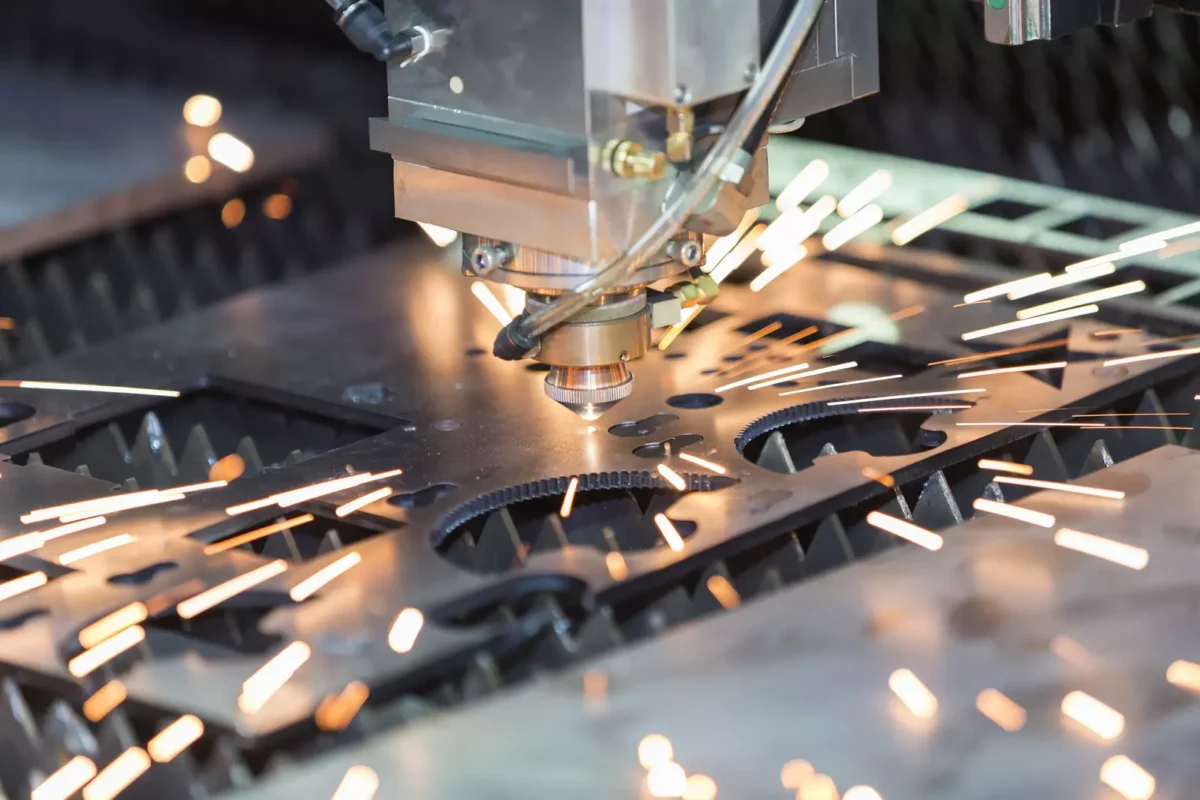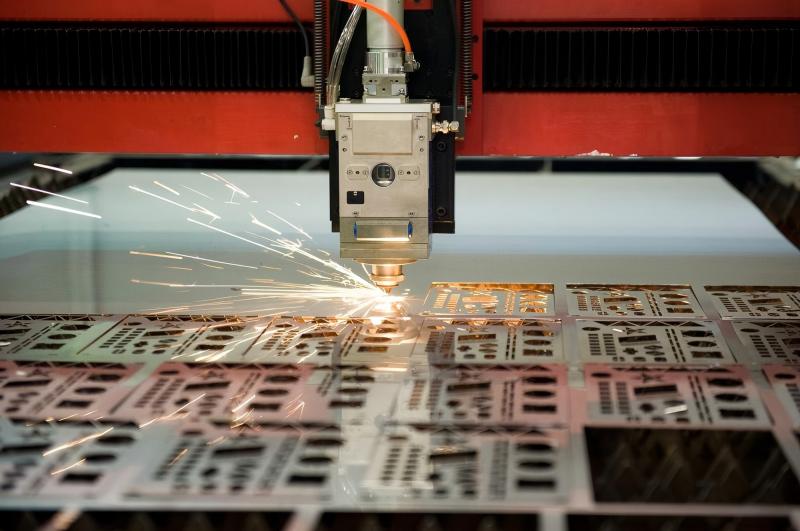Dokumentationszentrum
Umfassende technische Handbücher und Anleitungen, die Ihnen helfen, HARSLE-Maschinen zu beherrschen und Ihre Metallbearbeitungseffizienz zu optimieren
Welche Vorteile bieten Laserschneidmaschinen in der Energiebranche?
- Wie Laserschneidmaschinen die Effizienz im Energiesektor verbessern
- Vielseitigkeit von Laserschneidmaschinen in der Energiewirtschaft
- Kosteneinsparungen und weniger Abfall in der Produktion
- Verbesserte Sicherheit und Umweltvorteile
- Häufig gestellte Fragen
- Sind Laserschneidmaschinen für dicke Metallplatten geeignet, die in Energieanlagen verwendet werden?
- Kann Laserschneiden die Produktionskosten bei Energieprojekten senken?
- Welche in der Energiebranche häufig verwendeten Materialien können mit Laserschneidmaschinen bearbeitet werden?
- Sind Laserschneidmaschinen umweltfreundlich?
- Abschluss
Laserschneidmaschinen in der Energiebranche haben die Produktionsweise der Hersteller revolutioniert und bieten unübertroffene Präzision, Geschwindigkeit und Kosteneffizienz. Im heutigen wettbewerbsintensiven Energiesektor zeichnen sich diese Maschinen als leistungsstarke Lösung zum Schneiden einer Vielzahl von Metallen und Materialien mit außergewöhnlicher Genauigkeit und Vielseitigkeit aus. In diesem Artikel erläutere ich die wichtigsten Vorteile der Laserschneidtechnologie in Energieprojekten, erkläre, warum sie zunehmend traditionelle Schneidmethoden ersetzt, und zeige, wie sie zu höchster Qualität bei gleichzeitiger Kostenkontrolle beiträgt.
Wie Laserschneidmaschinen Verbesserung der Effizienz im Energiesektor

Laserschneidmaschinen werden häufig in der Energiebranche eingesetzt, da sie komplexe Teile mit unglaublicher Präzision und Geschwindigkeit bearbeiten können. Im Gegensatz zu mechanischen Schneidwerkzeugen schneiden Laser fokussierte Lichtstrahlen berührungslos durch Materialien und reduzieren so den Verschleiß der Geräte. Dieser berührungslose Prozess spart Zeit, verbessert die Genauigkeit und minimiert den Bedarf an Nachbearbeitung.
Schnellere Schnittgeschwindigkeiten und höhere Produktivität
Herkömmliche Schneidverfahren haben bei dicken oder komplexen Materialien oft Probleme, was zu langsamen Produktionsraten führt. Laserschneidmaschinen bieten Hochgeschwindigkeitsschneidfunktionen und ermöglichen so die schnelle Bearbeitung großer Mengen an Blechen, Rohren oder kundenspezifischen Komponenten. Dieser Geschwindigkeitsvorteil ist besonders wertvoll bei großen Energieprojekten, bei denen Termine entscheidend sind.
Konstante Qualität und Präzision

In der Energiebranche können selbst kleinste Maßfehler zu kostspieligen Ausfallzeiten oder Sicherheitsproblemen führen. Laserschneiden gewährleistet enge Toleranzen und saubere Kanten, die für Komponenten in Windkraftanlagen, Solarmodulstrukturen, Öl- und Gaspipelines sowie Kraftwerksausrüstungen unerlässlich sind. Die hohe Genauigkeit reduziert Materialabfall und vermeidet kostspielige Nacharbeiten.
Vielseitigkeit von Laserschneidmaschinen in der Energiewirtschaft
Die Laserschneidtechnologie ist nicht auf ein bestimmtes Material oder Design beschränkt. Diese Vielseitigkeit ermöglicht es Herstellern, eine breite Palette von Teilen für verschiedene Energiesektoren herzustellen, von der Erzeugung erneuerbarer Energien bis hin zur Öl- und Gasinfrastruktur.
Fähigkeit, verschiedene Materialien zu schneiden
Energieprojekte erfordern häufig Komponenten aus Edelstahl, Kohlenstoffstahl, Aluminium, Kupfer oder Speziallegierungen. Laserschneidmaschinen können all diese Materialien problemlos verarbeiten und erzeugen saubere Schnitte ohne mehrere Werkzeuge oder Umrüstvorgänge.
Komplexe und benutzerdefinierte Formen

Moderne Energieanlagen erfordern oft komplexe Muster und spezielle Schnitte. Laserschneidmaschinen können komplexe CAD-Designs präzise umsetzen und ermöglichen so die Herstellung kundenspezifischer Teile für einzigartige Projekte, ohne dabei an Geschwindigkeit oder Genauigkeit einzubüßen.
Kosteneinsparungen und weniger Abfall in der Produktion
Laserschneidmaschinen steigern nicht nur die Produktivität, sondern tragen auch zur Senkung der Betriebskosten bei, was im Energiesektor, wo die Projektbudgets knapp sein können, ein entscheidender Vorteil ist.
Minimaler Materialabfall
Da Laserstrahlen extrem präzise arbeiten, erzeugen sie schmale Schnittbreiten und ermöglichen eine optimale Materialausnutzung. Dies reduziert den Ausschuss und maximiert die Anzahl der aus jedem Blech oder Rohr gefertigten Teile, was wiederum die Materialkosten senkt.
Geringere Wartungs- und Betriebskosten

Da das Laserschneiden berührungslos erfolgt, wird der Werkzeugverschleiß vermieden und der Wartungsaufwand im Vergleich zu herkömmlichen Schneidemaschinen deutlich reduziert. Dies führt zu einer längeren Maschinenlebensdauer und niedrigeren langfristigen Betriebskosten.
Verbesserte Sicherheit und Umweltvorteile
Sicherheit und Nachhaltigkeit sind wichtige Aspekte der modernen Energieerzeugung. Die Laserschneidtechnologie trägt dazu bei, beides zu erreichen.
Sauberer Schneidprozess

Im Gegensatz zu mechanischen Schneidverfahren, bei denen Späne und Ablagerungen entstehen, erzeugt das Laserschneiden glatte, gratfreie Kanten mit minimalen Nebenprodukten. Zudem reduziert es den Bedarf an schädlichen chemischen Reinigungsprozessen und ist somit sicherer für die Arbeiter und umweltfreundlicher.
Automatisierung und reduzierte manuelle Handhabung
Die meisten Laserschneidmaschinen lassen sich automatisieren, wodurch die Gefahren für den Bediener beim Schneiden minimiert werden. Automatisierte Systeme verbessern zudem die Konsistenz und reduzieren das Risiko menschlicher Fehler bei hochpräzisen Energieprojekten.
Häufig gestellte Fragen
Sind Laserschneidmaschinen für dicke Metallplatten geeignet, die in Energieanlagen verwendet werden?
Ja, moderne Hochleistungs-Laserschneidmaschinen können problemlos dicke Platten schneiden, die in Windtürmen, Ölplattformen und schweren Energieanlagen verwendet werden, und dabei Präzision und Geschwindigkeit beibehalten.
Kann Laserschneiden die Produktionskosten bei Energieprojekten senken?
Auf jeden Fall. Durch die Reduzierung von Materialabfall, die Minimierung von Nacharbeiten und die Erhöhung der Schneidgeschwindigkeit tragen Laserschneidmaschinen dazu bei, die Gesamtproduktionskosten im Vergleich zu herkömmlichen Methoden zu senken.
Welche in der Energiebranche häufig verwendeten Materialien können mit Laserschneidmaschinen bearbeitet werden?
Laserschneidmaschinen können Edelstahl, Kohlenstoffstahl, Aluminium, Kupfer und andere Legierungen, die in der Fertigung im Energiesektor häufig verwendet werden, effizient verarbeiten.
Sind Laserschneidmaschinen umweltfreundlich?
Ja, der Prozess erzeugt weniger Abfall, erfordert keine Schneidöle oder schädlichen Chemikalien und reduziert den Energieverbrauch im Vergleich zu vielen mechanischen Schneidtechniken.
Abschluss
Laserschneidmaschinen bieten in der Energiebranche erhebliche Vorteile wie verbesserte Präzision, höhere Produktivität, weniger Materialabfall und erhöhte Sicherheit. Ob Sie Komponenten für erneuerbare Energien, Öl und Gas oder die Stromerzeugung herstellen – mit der Investition in Laserschneidtechnologie erfüllen Sie strenge Qualitätsstandards, senken gleichzeitig die Kosten und verbessern die Nachhaltigkeit.
Für weitere Informationen zur Auswahl der richtigen Laserschneidmaschine für Ihre Energieprojekte wenden Sie sich bitte an unser HARSLE-Team. Wir helfen Ihnen, die besten Lösungen zur Optimierung Ihres Produktionsprozesses zu finden.













